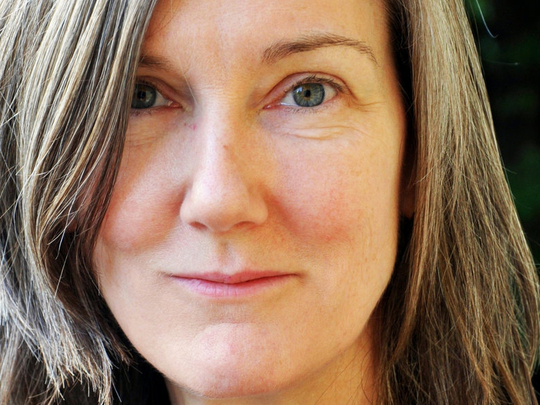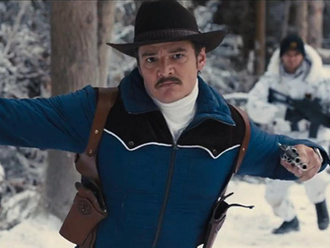
From behind, Nell Zink resembles a disaffected teenage boy. She scuffs down the pavement in flared jeans, an old hoodie. She got a royalty statement for her first novel — $12,000 (Dh44,078) — but her shoulders are hunched and head bowed in the universal posture of the dropout.
She is 51, something that is not apparent, even from the front. She mumbles the start of an apology, indicating the hoodie. “This is Fred’s,” she says. Fred is the friend Zink stays with on trips to Berlin, which is where she prefers to meet visiting journalists, well away from her home, 80 kilometres away in the small town of Bad Belzig. And then she explains: “I got my sweater ripped yesterday by this Nazi chick.”
It’s an arresting opener, and as with much of what Zink says, sounds like a joke or the start of an incredibly long story. In speech at least, Zink doesn’t do brevity; she says things such as: “To cut a long story long ...” It is one of her many paradoxes that, despite this tendency, both her published novels are extremely short. But nothing about Zink is average.
She drafted “Nicotine”, out next year, in a month. The same with “Mislaid”, her second novel, published in Britain recently in a boxed set with her American debut “The Wallcreeper”, a large section of which clattered over the keyboard in only four days. That was really an exercise in “sticking it to the man”, the man being Jonathan Franzen, the literary heavyweight who became her pen pal and the novel’s first reader.
For Zink, speed is a sign of proficiency. “No one expected Rembrandt to spend 10 years on a [expletive] painting,” she says. “He acquired the skills ... to be able to do it in a day and a half.” She compares her own composition process to “a cuckoo clock ... The wheels turn in silence, and then everything lines up and the cuckoo comes out and says its piece.” She does a little trill. “And then the door closes again.”
To judge the scale of publishing’s infatuation with Zink, consider that after selling the latest book, her agent phoned with bad news. “She sounded as if she was on the phone to tell [me] she had a diagnosis of lung cancer,” Zink says. “Nicotine” had sold for $425,000. “She wanted a million.”
Like a lot of Zink’s apparent exaggerations, the “Nazi chick” turns out to be real (though not actually a Nazi). Zink won’t talk about it, she says, before launching into a detailed retelling of the woman’s placard; the woman’s claim to be marching on behalf of Jewish members of Pegida, Germany’s burgeoning anti-Muslim protest group.
Zink “pulled on the placard”, an infringement for which she was held by a policeman for 45 minutes. This was and was not a big deal: she dislikes stress, but is also disinclined to obedience. Anyhow, the policeman released her after Zink proved her identity by Googling her own name and showing him the results on her phone.
About 10 months ago, that escape route would have been unavailable. As Zink says: “In September, they would not have found a photo of me online.” That is because last October, Zink’s life changed. “The Wallcreeper” came out in the US to rave reviews. “The New York Times” called it “a very funny, very strange work of unhinged brilliance”.
Franzen himself said the book “insistently raises the possibility that the world is larger and stranger than the world you think you know”.
The story of how Zink met “Agent Franzen” — she wrote to him through Macmillan and, four months later, received a longhand reply — is already the stuff of publishing folklore. But Zink, who is American and grew up in rural Virginia, is not keen on the conventional telling.
“The part about the birds gets lost in this narrative because nobody gives a flying [expletive] about it,” she says. She initially wrote to Franzen, a keen birder, to draw his attention to the plight of the pristine wetlands of Albania where hunters prevailed. Zink switches to a sort of rapping voice. “I said, ‘You got to write another article! About the Balkans! Because the Balkans are cool!’”
We are sitting by the Spree now, Berlin’s main waterway, legs dangling over the river wall, while coots scoot the surface. Appropriately, the birdwatching narrative came good: Franzen’s article about the Balkans for “National Geographic” led to a two-year moratorium on hunting in Albania.
The other thing that happened is that Franzen wrote back to Zink, “saying, ‘You’re an amazing writer.’” Which, to Zink, was “sort of perturbing. Because I wasn’t really in touch with any native English speakers outside my immediate family. And then all of a sudden I’m getting a compliment on my writing for the first time in 25 years. From a stranger. And it happened to be him.”
It was when Zink’s mother was dying, three years ago, that the e-mails to Franzen intensified. “And that was when he put his foot down and said, ‘OK, we’re going to do this. You can’t go on writing like this, for me.’” Her hands have been folded over her brow in an improvised peak against the sun, but at the mention of her mother, she leaps up and wheels around so the sun is at her back.
Zink is a curious mixture. She is feted but firmly outside the literary establishment, tucked away in Bad Belzig with a partner she refers to as “Mystery Boy”, unafraid to deliver damning judgments for the sake of honesty.
Even Franzen is not exempt. She had not read his work when she wrote to him, but after he replied, she bought a copy of “Freedom”, “and ... I didn’t think it was very good at all. It seemed to me ... like the very stodgy, square conservative work of a guy who is not really stodgy, square and conservative.”
She dismisses “A Visit from the Goon Squad” by Jennifer Egan as “in one ear and out the other”, and the fictional debut of publishing legend Jonathan Galassi, aged 60, “has the same flaws as everybody else’s first novel”. When I mention Lionel Shriver, Zink talks about “him”, apparently unaware that Shriver is a woman.
All to the good, because Zink’s brand is built on being an outsider, or, as she puts it, “a naive, on-the-job, training novelist”. If she were an insider, she probably would have felt obliged to consider plot, which is not something that holds her back in “The Wallcreeper”. (She had no idea of the story when she started.)
What that novel, and “Mislaid”, both have is voice, humour, sharpness. Each sentence feels like a long journey diverted. Each successive sentence is an upheaval. She is an unsettling writer to read. Plot is crammed into subclauses. Full stops feel like a collision. This is how “The Wallcreeper” begins: “I was looking at the map when Stephen swerved, hit the rock, and occasioned the miscarriage.”
“Mislaid”, the second novel, is a story of concept more than character. Its protagonist is a female student who has children with a male poet. The student flees with a child to the south, where they pretend to be black. It is brilliantly entertaining, but impossible not to wonder how much further it might have gone if Zink had given it more time.
Both books are a take on the coming-of-age novel, which is a popular genre for debuts, but perhaps not those written in middle age. Zink was 47 when she drafted “The Wallcreeper”. Maybe meeting Franzen, and the death of her mother (“She encouraged me a lot, she also thought I sucked”) somehow freed her to write for the first time with public, rather than private, ambition.
For years, Zink considered herself “a secret writer”. She created “art for art’s sake”: novelistic letters to friends; a fanzine called “Animal Review” to which indie-rock artists contributed prose about their favourite animals. (Steve Albini wrote about lemurs.) And all while making a living variously as a masonry repair worker, a secretary, a cocktail waitress, a translator and a life model. (She sweated far too much.) And then finally along came Franzen, and her mother passed away ... maybe writing for an audience was its own coming of age.
“I hope you’re not going to ramble on about my mother!” Zink exclaims. She is aggrieved that the “New Yorker’s” interviewer did that, and also claimed that Zink snapped at her. Very quietly, Zink retorts: “And I didn’t snap. I didn’t snap .”
Maybe Zink does snap sometimes, because a “Paris Review” article refers to “riotous, pummelling insults”. The reply is immediate. “I snapped at that [expletive] because he deserved not to be snapped, he deserved to be slapped. He was impossible!”
It is interesting to see how Zink’s anger carries her to a completely different place, as if in some kind of intellectual atonement for loss of temper. “Any word I write, he’s going to put on his blog, and it’s going to be online for the rest of the existence of the universe, until the rivers run dry. Because the rivers are where they get the power to run the ... cloud,” she says, with rising anger.
“I’m not snapping!” she adds, then stops before proceeding with deliberate emphasis. “I’m just angry because they are damming rivers in Oregon to run server farms for Amazon and Google.” She is glaring intently, as if only a moron would think this conversation had ever been about anything else.
You see, you just never know where Zink is going to take you.
–Guardian News & Media Ltd









